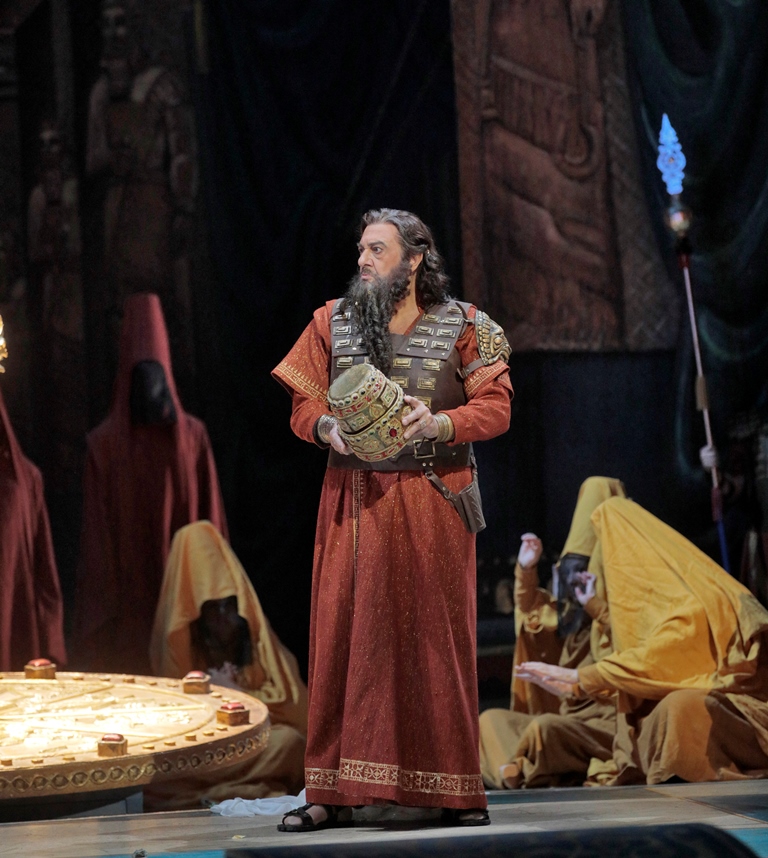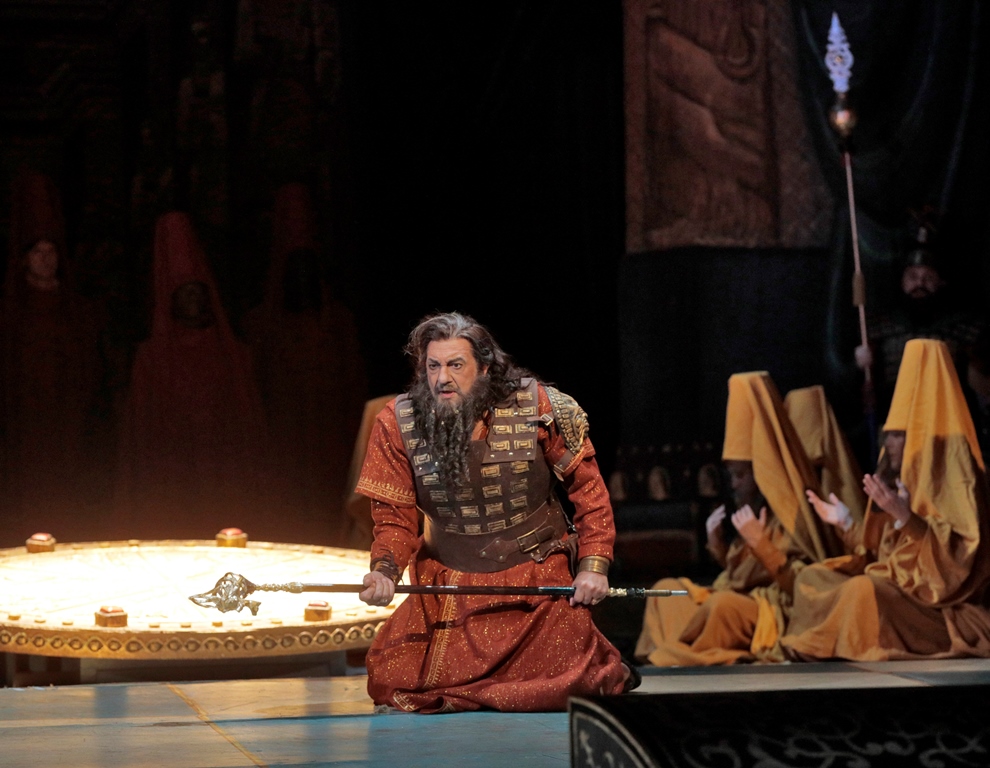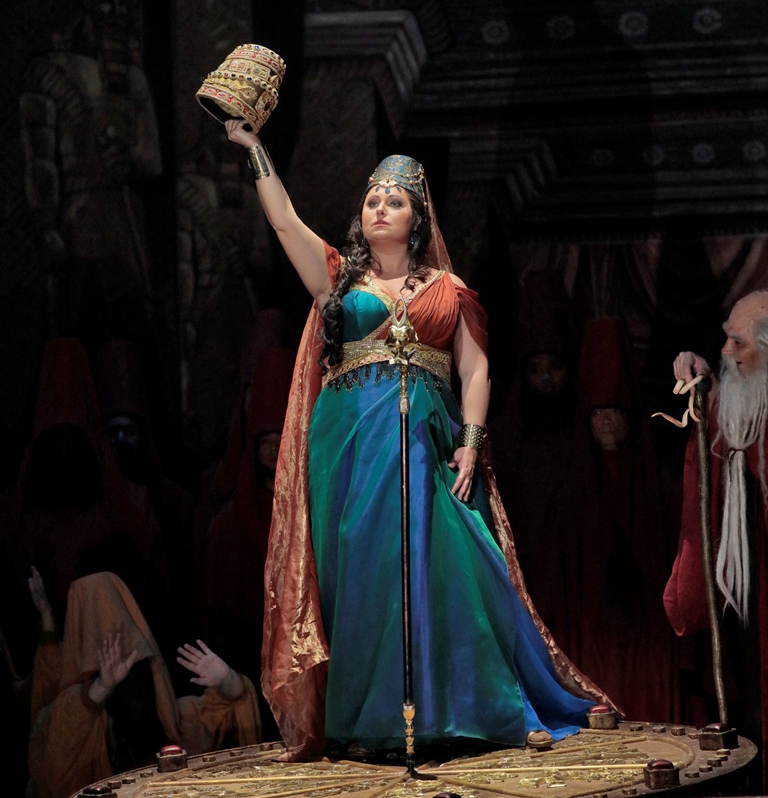Domingo Is Nabucco in LA Opera’s Authentic Period Production
/By Truman C. Wang
11/2/2017
Photo Credit: Ken Howard / LA Opera
In his probing and vastly entertaining study, “Music & Musicians in Nineteenth Century Italy” (1991, Amadeus Press), John Rosselli presents a picture of opera in Europe, from England to Russia, in which the Italian singers reigned supreme, both during Austrian rule and after independence in 1869. Whatever social and political oppressions the Italians might have faced at home and abroad, they were able to express freely their Risorgimento sentiments in the opera houses, at least prior to the 1848 revolution. Thus, the premiere of “Nabucco” in 1842, with its nostalgic chorus ‘Va pensiero’ longing for the Italian fatherland, received zero Austrian censorship. In fact, Verdi dedicated the opera to an Austrian archduchess – surely not an act of a revolutionary as history has portrayed him, but a liberal-leaning opportunist who readily lent his name to the Risorgimento movement sweeping the new nation. For Verdi, a simple peasant from Busseto, the business of opera was his main concern, not politics nor nationalism.
With this historical background in mind, it's easier to understand LA Opera’s new production of “Nabucco”, directed and designed by Thaddeus Strassberger, that serves the dual purpose of recreating, splendidly, the original 1842 La Scala staging, as well as making a social commentary on Austrian oppression. The theater-in-theater framing allows for a clear view of the two strata of society co-existing (during the overture and the performance) and colliding (during the little final curtain ‘post-credits’ drama). The Austrian nobility are seen waltzing and walking down the aisle to their boxes with a military escort; while the working-class Italians sing and entertain for them on stage. It may seem like a somewhat unwieldy concept on paper but is beautifully well presented on stage.



Following the success of “Pearl Fishers”, LA Open again assembled a winning cast for “Nabucco”, featuring Plácido Domingo in the eponymous role. Mr. Domingo, amazingly, had sung the tenor role Ismaele some 35 years ago and here sings the agony of the flawed king of Babylon with heartrending pathos. No longer commanding a long-breathed legato line or precise pitching, Mr. Domingo nonetheless conveys deep eloquence in his Act III duet with Abigaille (a precursor of the Germont-Violetta duet in “La Traviata”), not to mention a commanding stage presence. Hopefully, Sony Classics will preserve this fine performance on Blu-ray DVD as they did last year’s “Macbeth”.
As his wicked adopted daughter Abigaille, Ukrainian soprano Liudmyla Monastyrska makes her auspicious L.A. debut in gleaming, razor-sharp voice, fierce and unflinching in her plot to steal the crown, but showing a surprisingly amount of morbidezza (soft pathos) at Nabucco’s plea for mercy in their dramatic Act III duet.
Filling out the other major roles are bass Morris Robinson’s imposing Zaccaria, mezzo-soprano Nancy Fabiola Herrera’s steely Fenena who sings her last-act prayer tenderly, and Mario Chang’s Ismaele – not quite the tenore di forza for the role but a sweet plangent tenor.
The LA Opera Chorus dispatches the all-important ‘Va Pensiero’ in a subdued, languid tone but gives a surprise, much more rousing, encore during the aforementioned ‘post-credits’. Music Director James Conlon, in his tenth year with the company, conducts a powerful performance, with plenty of vigor and rum-ti-tum raw excitement of early Verdi.
There are three more performances of “Nabucco” on November 8, 11 and 19.
Truman C. Wang is Editor-in-Chief of Classical Voice, whose articles have appeared in the San Gabriel Valley Tribune, the Pasadena Star-News, other Southern California publications, as well as the Hawaiian Chinese Daily.



